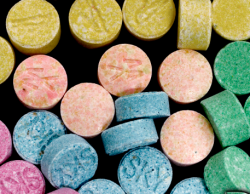Dangers of Hallucinogenic Drugs
Hallucinogenic drugs can have many dangerous effects for which users are often not prepared. Because these drugs highly affect the brain and the body, many dangerous incidents and conditions can occur as a result of abusing them. Here are some of the most dangerous aspects of hallucinogenic drugs.
Addiction
Some hallucinogenic drugs are addictive. While LSD “is not considered an addictive drug since it does not produce compulsive drug-seeking behavior” after long-time use, according to the NIDA, “PCP is addictive.” Because of this, the drug can cause:
- Cravings
- Compulsive drug-seeking behavior
- Dependence
- Withdrawal symptoms
- Life, work, school, relationship, and legal problems
- An inability to stop taking the drug
When someone begins to abuse drugs recreationally, they are usually in control of their decisions to take the drug. But over time, PCP abuse makes a person unable to stop taking the drug so that they continually abuse it, no matter what the consequences. Addiction is dangerous, and it can become impossible to stop without help, after which the individual may still be vulnerable to relapse.
Hallucinations and Behavior
One of the most dangerous effects of any hallucinogenic drug is the behavior it can cause. The NIDA states, “While intoxicated, PCP abusers may become violent or suicidal and are therefore dangerous to themselves and others.”

Hallucinogenic drugs can cause a lack of control.
Hallucinations are a common effect of these drugs and are often the main reason behind a person’s desire to take them. These hallucinations can be dangerous though, and with drugs like psilocybin or other hallucinogens, “a lack of control over thinking processes and concentration” may result (NSW). A person may get behind the wheel of a car when intoxicated, thinking they are fine, and seriously hurt themselves or someone else. Or they may see a hallucination which scares them and do something dangerous to try and get away.
The behavior that individuals exhibit while on hallucinogenic drugs is extremely dangerous.
Physical Dangers
Hallucinogenic drugs also put individuals in physical danger as well, although it does not lead to death as often as the behavioral issues. Certain hallucinogens have different physical effects on the body, many of which can be highly dangerous.
- LSD
- Dizziness
- Raised body temperature
- Nausea
- Blurry vision
- Tremors
- Palpitations
- Peyote
- Raised body temperature
- Increased heart rate
- Uncoordinated movements
- Psilocybin
- Nausea
- Vomiting
- Drowsiness
- Muscle relaxation
- PCP
- Increased breathing rate
- Numbness in extremities
- Loss of muscular coordination
- Coma
- Seizures
Long-Term Effects
The effects of hallucinogens can become even more hazardous when someone abuses them in the long-term. People have commonly experienced flashbacks which can be extremely dangerous and can occur years after the drug abuse stops. Memory and concentration can become impaired which can be dangerous for the individual as well, and stress, panic, and depression are all issues that former hallucinogen abusers deal with more often and with less success.
Hallucinogens can cause dangerous effects, not only in someone intoxicated, but in someone who continues to abuse the drug in the long-term, strengthening the possibility of flashbacks, concentration issues, and memory problems. And, if someone is intoxicated and violent, it can be dangerous for them as well as anyone around.
- Related Articles
 Dangerous Peyote Drug Effects -
Peyote is a naturally occurring hallucinogenic drug found in South America.
Dangerous Peyote Drug Effects -
Peyote is a naturally occurring hallucinogenic drug found in South America.  Dangerous Hallucinogens Effects on the Psyche -
Hallucinogens are drugs that completely mess up the chemical structure of the user’s brain. Hallucinogens, such as LSD or PCP, will cause a person’s mood to alter while making them see things that are not really there. There are numerous dangers that hallucinogens cause to the human psyche.
Dangerous Hallucinogens Effects on the Psyche -
Hallucinogens are drugs that completely mess up the chemical structure of the user’s brain. Hallucinogens, such as LSD or PCP, will cause a person’s mood to alter while making them see things that are not really there. There are numerous dangers that hallucinogens cause to the human psyche.  The Dangers of Hallucinogen Abuse -
Abusing hallucinogens can lead to many adverse physical and psychological problems, some of which can become permanent.
The Dangers of Hallucinogen Abuse -
Abusing hallucinogens can lead to many adverse physical and psychological problems, some of which can become permanent.  How Hallucinogen Abuse Can Harm Your Health -
In addition to the infamous 'bad trip', hallucinogen use can lead to a variety of dangerous physical and psychological side effects.
How Hallucinogen Abuse Can Harm Your Health -
In addition to the infamous 'bad trip', hallucinogen use can lead to a variety of dangerous physical and psychological side effects.  Common Effects of Hallucinogens -
The potential short and long term effects of hallucinogen abuse should not be taken lightly, as many of them can be life-threatening.
Common Effects of Hallucinogens -
The potential short and long term effects of hallucinogen abuse should not be taken lightly, as many of them can be life-threatening.